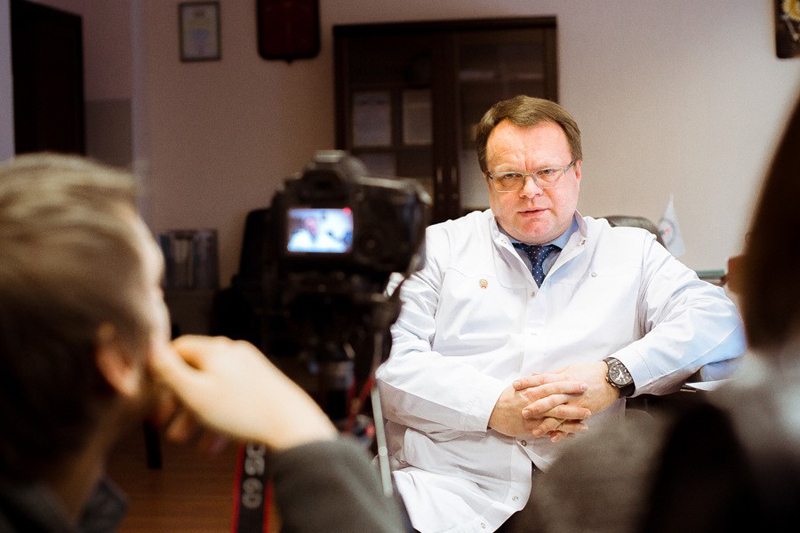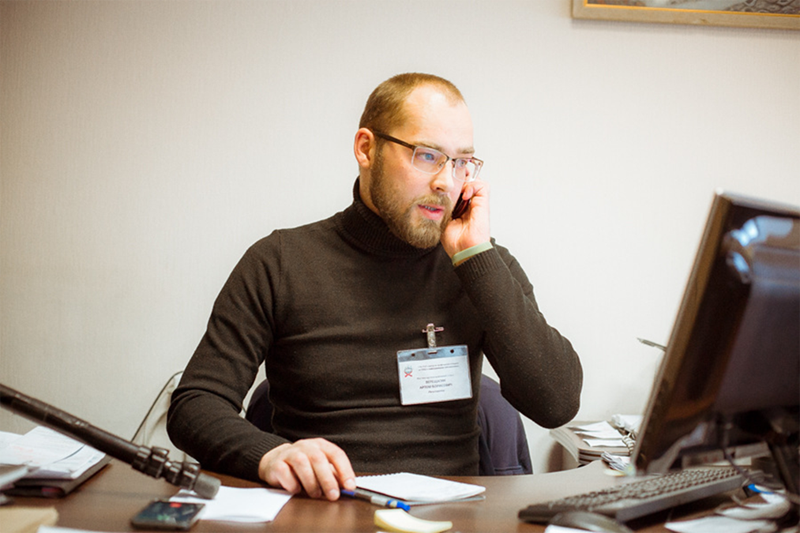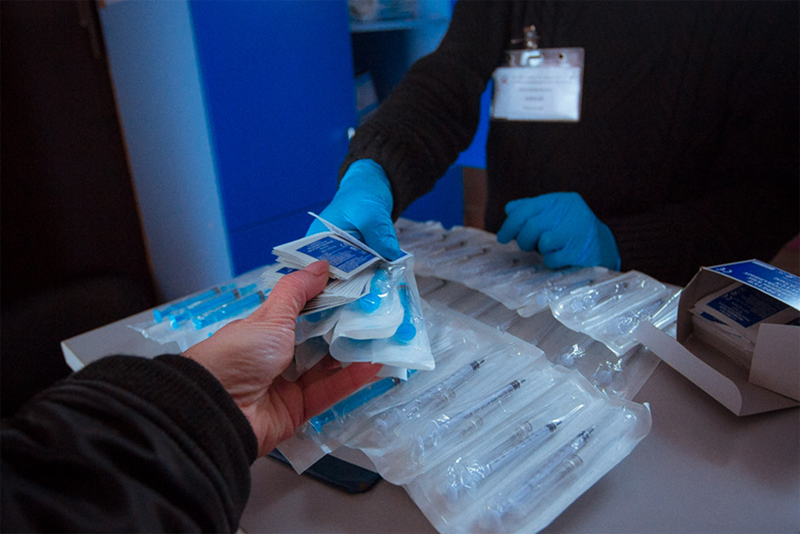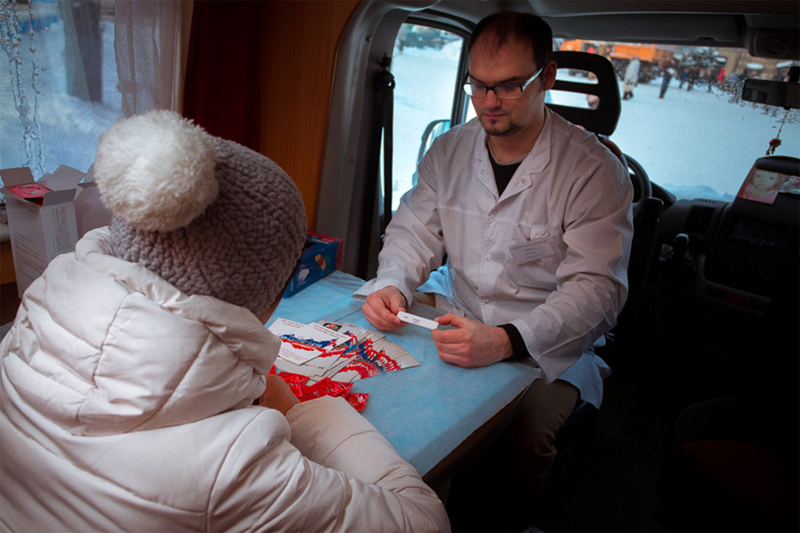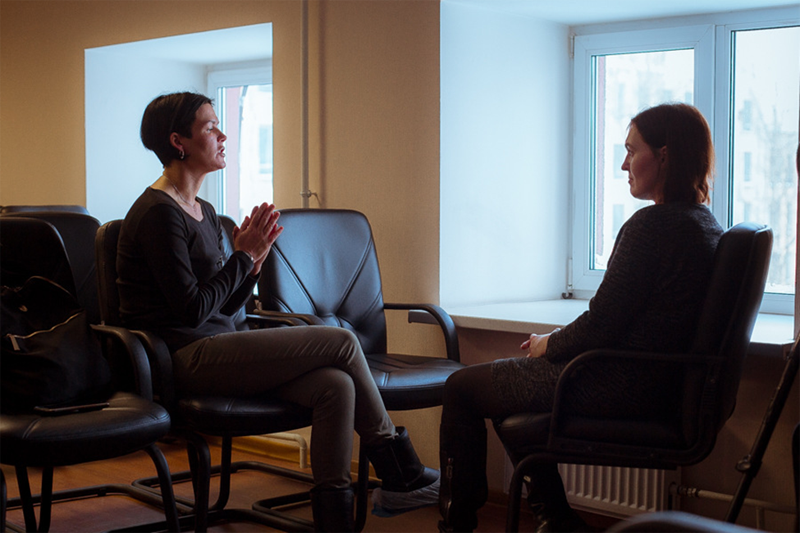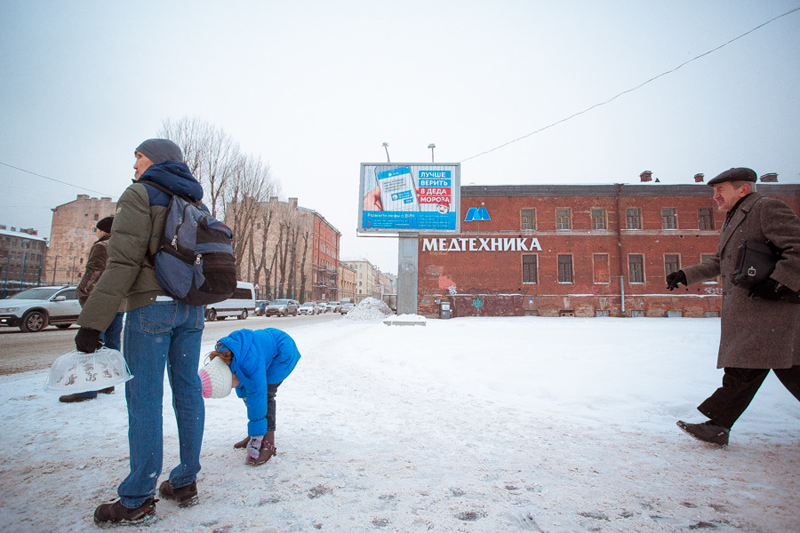Originally published by UNESCO on 16 October 2019
On 9 October, Po Pravde Govorya, an educational show by UNESCO, UNAIDS and OK.RU, went live on air to discuss how to talk with teenagers about health and sexual relations. The Russian social network Odnoklassniki hosted Po Pravde Govorya, [Telling the Truth], a live talk show co-organized by the UNESCO Institute for Information Technologies in Education (UNESCO IITE) and the UNAIDS Regional Office for Eastern Europe and Central Asia (UNAIDS EECA). Experts and celebrity parents discussed ways of talking with kids and teens about complex issues such as puberty, sexual relationships, personal boundaries, HIV and AIDS, and much more. The two-hour show hosted by TV presenter and journalist Lika Dlugach, received some 1.3 million views and 1,320 likes from OK.RU users.
The talk show guests included film and theater actress Elena Borshcheva, journalist Tatiana Nikonova, family therapist Marina Travkova, obstetrician-gynecologist Tatiana Rumyantseva, Alfiya Maksutova, editor-in-chief of DVOR, a social media page for youth, Vinay Saldanha, UNAIDS Regional Director for Eastern Europe & Central Asia, and Tigran Yepoyan, UNESCO Regional Health Education Advisor.
They used examples from their personal life and professional practice to illustrate how to discuss sensitive issues with kids and teens in an atmosphere of trust and without embarrassment, how to help young people make sense of what happens to their minds and bodies as they reach the challenging period of puberty, and how to educate them, honestly and non-judgmentally, about the basics of health and relationships.
Should we talk with kids and teens about sex and if so, how to do it right?
Marina Travkova, family therapist
We should tell them the truth in a way that is adapted to their age. But I would like really like all parents to understand that they do not need their child to be a certain age or to pick a special time and place for this conversation. Like it or not, you have been communicating with your kids about sex all the time since the moment they were born, because understanding sexuality is not only about technical knowledge of where babies come from. There is a lot more to it, including how your children feel about themselves, their personal boundaries, whether or not they tolerate uncomfortable clothes, how they feel about being hungry, whether they can refuse to kiss a granny who loves them. All of these are integral parts of our sexuality. The hands of the father and mother who hold and caress the baby build the first layer of what will later become his or her sexuality. How they feel about themselves, their body, the world around, their personal boundaries. We’ve been having this conversation with our kids all the time by sending them messages about the way to live their lives, to make choices, to fall in love, and to treat their bodies. When your child approaches you with a concrete question, this is a moment not to be missed – a moment of trust. Parents who feel at a loss or afraid to say the wrong thing should remember that it’s always possible to say, “I don’t really know, to be honest,” and perhaps find and offer your child a good book on the topic. You also need to understand that today, teens live in an incredibly open world, and the average age they are introduced to pornography is 9 to 11. Indeed, many teens today say or write, “How can I explain to my mom that she needs to read something about sex?” This is the way teens take care of their parents.
What questions do teens want answered?
Tatiana Nikonova, journalist
Most of the time, teens seek answers to questions which have little to do with what adults want them to ask about. What are most parents concerned about? Pregnancy, bad company, sexually transmitted diseases. But teenagers are interested in relationships. What to do and say, how to tell a person you love them, how to survive rejection, how to say no, and how to deal with the fact that everyone knows something about you that you’d rather keep private. Very often, teens struggle with the issues of bullying and aggression. What happens on a date and what can happen besides being offered sex – this is also something they’d like to know.
How to be more confident talking with your children?
Marina Travkova, family therapist
I can share two lifehacks with parents of teenagers. The first is to speak honestly about yourself, e.g. about the first time you fell in love, the first time you said no to a boy who was in love with you and how it made you feel – all of this has great value for your child. The second lifehack is to be honest with them about your fears.
Tatiana Nikonova, journalist
Discuss TV serials with them – something is always happening there! Like, unplanned pregnancies, complex diseases, breakups, misunderstandings – these are the most common stories in TV shows and a virtually endless source of topics for discussion.
Is it true that sex education can encourage young people to have sex earlier in life?
Vinay Saldanha, UNAIDS Regional Director for EECA
Numerous studies in different countries have found that not only sexuality education programs do not lead to an earlier or more active onset of sexual life, but have the opposite effect: adolescents tend to have a later sexual debut, fewer partners, a lower incidence of risky behaviors, and they are more responsible about the use of condoms and contraception. Together, this reduces the risks of contracting HIV and other sexually transmitted infections. Of course, such programs must be age-appropriate, evidence-based and, most importantly, they must be timely, i.e. before children become adults, otherwise it will be too late. This is what is said in the International Technical Guidance on Sexuality Education developed by several UN organization led by UNESCO.
Why do we need to talk with children about HIV if most people who get infected are adults?
Vinay Saldanha, UNAIDS Regional Director for EECA
In EECA countries alone, dozens of thousands of children and adolescents live with HIV. Therefore, we cannot say that this disease does not concern children. But it is essential to have a high-quality sexuality education program to make sure that a discussion of these complex issues brings positive outcomes.
What can we do if a kid does not believe that HIV exists, because they have read on the internet that “HIV is a hoax”?
Tatiana Rumyantseva, obstetrician-gynecologist
Give this kid a link to the website of the World Health Organization, to other sites which discuss infections. There are many organizations of people living with HIV who work to help others. You can take the kid to such an organization and let him or her meet people there. This approach might work well with someone who responds to emotions more than to words.
How to talk about HIV and not scare people?
Tatiana Rumyantseva, obstetrician-gynecologist
This information serves as a warning. Speaking about infections, I would say that some of them cannot be cured but require lifelong treatment. It makes good sense to plant a grain of concern for their future in young people’s minds. We usually spell out the dangers which we want to protect children from, and the same should apply to sex.
What source of information would a teenager trust the most?
Elena Borshcheva, actress
Bloggers. All teens are watching bloggers. Good educational programs for teens on TV are lacking, so young people learn a lot from bloggers. It makes sense to share essential information through their idols.
Recently, I came across a book and read it before giving it to my daughter. The author is American, and some realities are different from ours, but the concept of personal boundaries in relationships not only between a boy and a girl but also between friends is very well explained. And I thought, “Where was this book when I was a child?” It explains, plain and simple, how to act in certain situations, how to check what’s right, and what to say.
We all want relationships in the first place, warm relationships in which we need and love each other, and sex is part of such relationships. But many people – especially young people — do not quite understand why sex is special and whether a girl can refuse a guy, although it is her right. They need to learn how to tell real love from being taken advantage of in a relationship.
Can websites help parents in educating their children, and how can we teach children to safely navigate the diverse resources?
Tigran Yepoyan, UNESCO Regional Health Education Advisor
Absolutely yes. There is an increasing number of such resources available for parents and for teenagers. As far as teenagers are concerned, media literacy is the key, and UNESCO has been working to help countries educate teachers about media literacy, so that they may teach their students. Here are some basic lifehacks: it is essential to help children develop an ability to critically assess and analyze information, never take it for granted but double-check and look at the source of information: who created the website, who are the authors of posted materials, whether they provide links to primary sources and refer to relevant experts and research findings; ask yourself whether the main purpose of the website is to provide objective information or to impose a particular behavior pattern or lifestyle, manipulate the reader, or sell a product or service.
About DVOR, an online community for teens
Alfiya Maksutova, DVOR editor-in-chief
We created DVOR with support from UNESCO to talk with teens about reproductive health. Most of our readers are under 21.
We cover several broad topics. The first is physiology: we discuss a variety of things related to one’s body and health, e.g. how the brain works or myths about penis length. The second is mental health: e.g. what is depression, how to deal with bullying, and how to survive rejection And finally, we discuss sex and everything related to sex.
The more something is taboo, the harder it is to discuss. But we always emphasize that there is nothing shameful about this discussion and we never try to hide behind academic terminology or euphemisms. Our goal is to create a safe and comfortable space for a well-informed discussion of this topic with teenagers. All our posts on the topic are based on recent research, and each text is reviewed by a relevant expert. And we also dilute serious content with comics and entertainment to create an atmosphere of trusting and relaxed communication. Seems like it works: every week, we receive warm and positive feedback from subscribers.
What are some of the approaches used by DVOR in discussing sensitive issues that teens’ parents can adopt?
Parents might find it super useful to look at our page if they plan to discuss such things with their teens. Let’s say I am a parent who wants to talk to their child about watching porn or using contraception. What do I need to know before I bring it up? I need hard facts, statistics, and an idea of how such things work. Because direct advice like “don’t watch porn for 8 hours a day” or “protect yourself if you have sex” aren’t nearly as effective as a fact-based explanation of how people become addicted to porn and why being protected is a good idea. And then I’ll let my child draw their own conclusions. All information that I may need for such conversations can be found on our page, with links to sources and references. Plus, everything is written in a language that teens can relate to and feel comfortable with, without judgment, vulgarity or euphemisms.
Po Pravde Govorya was broadcast live on OK.RU/TEST, an online community created with support from the UNAIDS Regional Office for EECA and UNESCO IITE.
Follow new show announcements, participate in surveys and competitions, and learn new things at OK.RU/TEST



